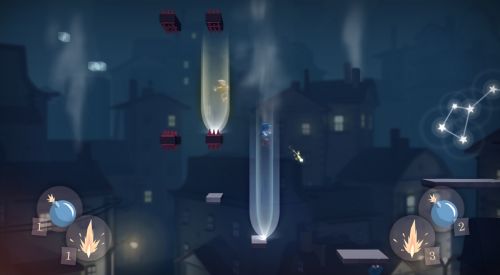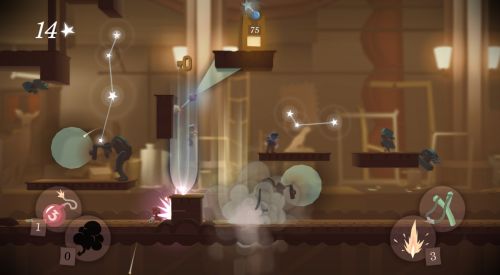
In a properly designed game, the player would land on top of the head and get a few hits in before being thrown off. Instead, the springs bounce you clear past his head. As such, you’ll be lucky to get even one hit in after several attempts. It takes something like 8 hits to kill him, so the fight is a tedious process of reaching the point where the spring pads appear, missing, and trying again. It took me more than half an hour to clear, but I’ve heard some players struggle for over an hour.
As if all of Pid’s issues with enemies, bosses, and environmental traps didn’t raise enough ire on their own, the collectible/Achievement system is the worst in recent memory. Let’s face it, nobody even likes collectibles. The only reason we seek them out is for the Achievements or Trophies. They change the way you play the game, forcing you to either stick to a guide or spend way too much time exploring every nook and cranny instead of just enjoying the game. And if you don’t use a guide, you’ll probably just miss one or more of them anyway.
Pid has not one, not two, but three different kinds of collectibles to seek: souvenirs, hidden constellations, and secret areas. None would be particularly offensive, if not for the linear nature of the game. Pid may look like a Metroidvania game, but it’s actually completely linear. Once you reach a new checkpoint (which aren’t marked), there is usually no way to return to the previous area. Keep in mind that there’s also no way to know whether an area contains any of the three types of collectibles, other than relying on online guides.
It’s entirely possible and likely that you’ll miss a collectible and have zero chance of going back to get it. The only solution would be to start a new game – and it takes eight or more hours just to finish the game. Why the developers forced linearity onto a design that doesn’t benefit from it, I’ll never know. Some of these same people worked on the disappointing retail Bionic Commando, a game that many also criticized for its missable collectibles. Might & Delight repeated an easily avoidable mistake.
Local 2-player mode starts out a bit confusingly, as when Kurt lands on the planet, the second person has no character to control. After a few moments, one of characters who would be an NPC in single-player introduces itself as Audrey and joins up with Kurt. Sadly, the second player cannot save his or her progress or earn Achievements. Co-op games are treated as a separate slot on the main player’s save file.
Co-op could have improved the game’s steep difficulty, if not for one inexplicable decision. In local 2-player games, each character can only throw one beam of light instead of two. Remember, the already cruel level designs often require the player to use both beams simultaneously. Well, with another person in the mix and only one beam each, navigating even relatively simple areas becomes incredibly unintuitive. Most of the time, you’re likely to kill each other by firing a new beam at the wrong moment, making your old one disappear. If either player dies, the remaining player only has one beam to work with. The deceased player will reappear at the next checkpoint.

These problems would have been solved by allowing both players to fire two beams each, just like in single-player. That would actually alleviate the difficulty of many platforming sections since you’d have four simultaneous beams to work with instead of two. Sadly, the existing implementation just makes a nut-kickingly tough game even harder. I’d be interested in seeing the metrics for completed co-op games. My guess is that the number of people to finish co-op will be virtually nonexistent. Had co-op been online, then at least difficulty hounds would have an easier time finding like-minded masochists to play with.
Pid should have been one of the best 2D platformers of the year. I love the game’s world, its inhabitants, and the beautiful art style. It’s even fun on occasion. But those moments are surrounded by such sheer unhappiness and frustration, souring a great deal of the experience. The ill-conceived co-op mode doesn’t do it any favors either. There is a good game somewhere beneath Pid’s layers of obtuse game design, but you'll probably remember the pain it produces more than the pleasure.
Pid sells for $19.99 on Xbox 360, PlayStation 3, and Steam. A Switch version will also be released in 2022.
The Co-Optimus review of Pid is based on the XBLA version of the game, which was provided by the publisher.
Verdict
Co-Op Score
Overall
The Co-Op Experience: In Pid's local co-op mode, each player controls a single beam of his or her own. That means they have to work together to cross gaps and avoid hazards.
Co-Optimus game reviews focus on the cooperative experience of a game, our final score graphic represents this experience along with an average score for the game overall. For an explanation of our scores please check our Review Score Explanation Guide.